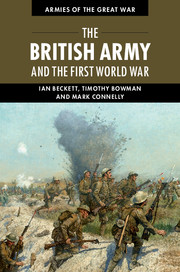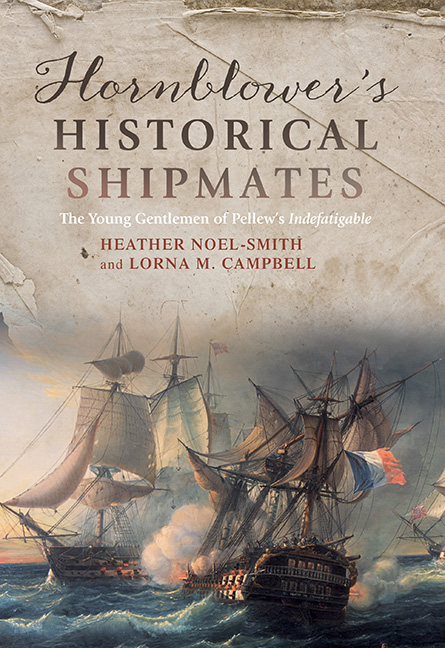Refine search
Actions for selected content:
15418 results in Military history

The British Army and the First World War
-
- Published online:
- 04 May 2017
- Print publication:
- 15 May 2017

Hornblower's Historical Shipmates
- The Young Gentlemen of Pellew's Indefatigable
-
- Published by:
- Boydell & Brewer
- Published online:
- 28 April 2017
- Print publication:
- 15 September 2016
1 - Capture
- from Part I - Behind the Wire
-
- Book:
- British Prisoners of War in First World War Germany
- Published online:
- 04 July 2017
- Print publication:
- 27 April 2017, pp 23-42
-
- Chapter
- Export citation
Maps
-
- Book:
- Anatomy of a Campaign
- Published online:
- 11 May 2017
- Print publication:
- 27 April 2017, pp xii-xii
-
- Chapter
- Export citation
6 - ‘Hare-Brained’
-
- Book:
- Anatomy of a Campaign
- Published online:
- 11 May 2017
- Print publication:
- 27 April 2017, pp 55-66
-
- Chapter
- Export citation
Appendix A - Operational Code Names
-
- Book:
- Anatomy of a Campaign
- Published online:
- 11 May 2017
- Print publication:
- 27 April 2017, pp 300-300
-
- Chapter
- Export citation
8 - Linking with Home
- from Part II - Prisoner Responses
-
- Book:
- British Prisoners of War in First World War Germany
- Published online:
- 04 July 2017
- Print publication:
- 27 April 2017, pp 226-258
-
- Chapter
- Export citation
Dedication
-
- Book:
- British Prisoners of War in First World War Germany
- Published online:
- 04 July 2017
- Print publication:
- 27 April 2017, pp v-vi
-
- Chapter
- Export citation
2 - ‘A Legitimate Side-Show’
-
- Book:
- Anatomy of a Campaign
- Published online:
- 11 May 2017
- Print publication:
- 27 April 2017, pp 20-28
-
- Chapter
- Export citation
5 - ‘The Major Project’
-
- Book:
- Anatomy of a Campaign
- Published online:
- 11 May 2017
- Print publication:
- 27 April 2017, pp 47-54
-
- Chapter
- Export citation
7 - Taking Stock
-
- Book:
- Anatomy of a Campaign
- Published online:
- 11 May 2017
- Print publication:
- 27 April 2017, pp 67-78
-
- Chapter
- Export citation
7 - Friends and Feuds
- from Part II - Prisoner Responses
-
- Book:
- British Prisoners of War in First World War Germany
- Published online:
- 04 July 2017
- Print publication:
- 27 April 2017, pp 190-225
-
- Chapter
- Export citation
19 - ‘A Good Dividend’?
-
- Book:
- Anatomy of a Campaign
- Published online:
- 11 May 2017
- Print publication:
- 27 April 2017, pp 240-247
-
- Chapter
- Export citation
Acknowledgements
-
- Book:
- British Prisoners of War in First World War Germany
- Published online:
- 04 July 2017
- Print publication:
- 27 April 2017, pp x-xii
-
- Chapter
- Export citation
Notes
-
- Book:
- Anatomy of a Campaign
- Published online:
- 11 May 2017
- Print publication:
- 27 April 2017, pp 306-359
-
- Chapter
- Export citation
9 - ‘Something Must Be Done’
-
- Book:
- Anatomy of a Campaign
- Published online:
- 11 May 2017
- Print publication:
- 27 April 2017, pp 87-99
-
- Chapter
- Export citation
Index
-
- Book:
- Anatomy of a Campaign
- Published online:
- 11 May 2017
- Print publication:
- 27 April 2017, pp 370-376
-
- Chapter
- Export citation
Copyright page
-
- Book:
- Anatomy of a Campaign
- Published online:
- 11 May 2017
- Print publication:
- 27 April 2017, pp iv-iv
-
- Chapter
- Export citation
17 - The Third Dimension
-
- Book:
- Anatomy of a Campaign
- Published online:
- 11 May 2017
- Print publication:
- 27 April 2017, pp 218-229
-
- Chapter
- Export citation
2 - The Camps
- from Part I - Behind the Wire
-
- Book:
- British Prisoners of War in First World War Germany
- Published online:
- 04 July 2017
- Print publication:
- 27 April 2017, pp 43-77
-
- Chapter
- Export citation
